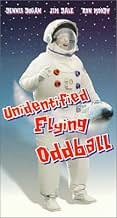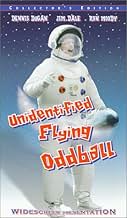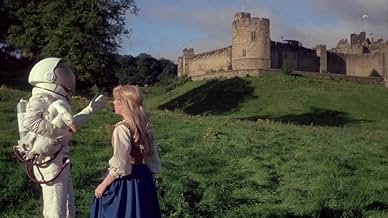AVALIAÇÃO DA IMDb
5,2/10
1,5 mil
SUA AVALIAÇÃO
Adicionar um enredo no seu idiomaAn astronaut and his android double travel back to the time of King Arthur.An astronaut and his android double travel back to the time of King Arthur.An astronaut and his android double travel back to the time of King Arthur.
John Le Mesurier
- Sir Gawain
- (as John le Mesurier)
Bruce Boa
- Air Force Officer
- (não creditado)
Al Lampert
- NASA Technician
- (não creditado)
Derek Suthern
- NASA VIP
- (não creditado)
Avaliações em destaque
This movie certainly has its moments. It's quirky and weird, with some truly original scenes, which is what makes it intriguing. Unfortunately, that is the only thing that is good about it, and it's not enough to keep it entertaining for its entire runtime.
Those little bits of weirdness might work better in a short film, but ultimately I was bored with this feature very quickly. The acting is bad and the goofiness of the whole thing gets annoying after a few minutes. Do not recommend.
Those little bits of weirdness might work better in a short film, but ultimately I was bored with this feature very quickly. The acting is bad and the goofiness of the whole thing gets annoying after a few minutes. Do not recommend.
I remember first seeing this film when it first came out and again in the early 80's as a special film showing at the elementary school I attended. While I agree with the "Suprise it's crap after all" comment that this was not Disney's best movie, I disagree that it was not an entertaining film for a child as I was one when I saw this. First at age 9 and a few years later I still enjoyed it.
I did find it amusing that the title changed a few times and even recall part of the original trailer song. It went something like..."The Unidentified Flying Oddball, it's undeniably oddball, he's the wrongway astronaut that traveled back to Camelot, lasers flash...." I cannot recall the rest perhaps someone can help there. It was very hokey sounding but hey, this film wasn't meant to be serious, just good old fun. I recommend it as a rental.
I did find it amusing that the title changed a few times and even recall part of the original trailer song. It went something like..."The Unidentified Flying Oddball, it's undeniably oddball, he's the wrongway astronaut that traveled back to Camelot, lasers flash...." I cannot recall the rest perhaps someone can help there. It was very hokey sounding but hey, this film wasn't meant to be serious, just good old fun. I recommend it as a rental.
Based on the ratings and reviews, this movie seems to have a problem with expectation management. It's a Disney movie, but its production standards aren't as uniformly high as one might expect. Apparently they had to cut some corners. This film came out 2 years after Star Wars: Episódio IV - Uma Nova Esperança (1977), but its special effects aren't far above Jornada nas Estrelas (1966) in quality. Also there is something odd about the plot that suggests late changes. (Someone just disappears, suggesting that he died, and is never mourned.)
Some reviewers complain about a lack of realism. I think they are really missing the point. This kind of movie doesn't have to be realistic. The original novel is basically an extended joke, and so is this film. What matters is whether it is a good joke and whether it follows the internal logic of fiction. On these accounts its actually a really good movie.
LONG DIGRESSION ON LANGUAGE
In his novel A Connecticut Yankee at King Arthur's Court, Mark Twain dates King Arthur (who likely wasn't a historical person) in the 6th century, and so does this film, which is very loosely based on the book. To get an idea of how long ago that was:
What we think of as England today wasn't a country yet but a region consisting of many small countries. The Romans had left in the early 5th century, and Anglo-Saxons from the North Sea coast of Germany, Denmark and the Netherlands were coming to England, bringing with them the Germanic dialects that would soon develop into Old English (also called Anglo-Saxon). But at the time of the film's setting we don't even call that language Old English yet because that name is preserved for the earliest form preserved in writing. It wasn't before the following century, the 7th century, that England became mostly Christian and the earliest preserved texts in Old English were written.
Here is what the Lord's Prayer looked like in 995, over 400 years AFTER the supposed time of King Arthur:
Fæder uure / þuu þee eart on heofonum / Sii þiin nama gehaalgod / Too becume þiin rice / Gewurþe þiin willa / On erðon swaa swaa on heofonum / ...
Mark Twain would have had a hard time writing in this language, and his readers wouldn't have understood him. Even Middle English was too antiquated for his purposes. Here is the same text in a Middle English version from 1389:
Oure fadir / That art in hevenes / Halwid be thi name / Thi kingdom come to / Be thi wille don / On erthe as in hevenes / ...
Much better, but still too antiquated. So Mark Twain used the English of Shakespeare and the original King James Bible: Early Modern English. And so do most film adaptations. Only, they almost invariably get the grammar wrong. Which is very jarring to speakers of other Germanic languages, who tend to have a better feel for Early Modern English grammar than most native English speakers. Anyway, here is a correct version from 1611 in Early Modern English, taken from the King James Bible:
Our father which art in heauen, / hallowed be thy name / Thy kingdome come. / Thy will be done, / in earth, as it is in heauen. / ...
I am glad that this film generally doesn't even try to use Early Modern English in the dialogs, leaving only a few instances of the usual wrong grammar and making the dialogs flow better.
END OF DIGRESSION.
Of course the time travel aspect (and in fact also the space travel aspect) isn't realistic either. And doesn't have to be. All that matters is that it follows its own internal logic. Which it does.
The film's plot makes good use of the idea of an astronaut arriving at King Arthur's court rather than a distant planet. Unfortunately it overdoes the special effects, which are not its strength, and doesn't make as much use of its excellent actors as it could have done. But overall it's great fun if you are prepared to be entertained.
Some reviewers complain about a lack of realism. I think they are really missing the point. This kind of movie doesn't have to be realistic. The original novel is basically an extended joke, and so is this film. What matters is whether it is a good joke and whether it follows the internal logic of fiction. On these accounts its actually a really good movie.
LONG DIGRESSION ON LANGUAGE
In his novel A Connecticut Yankee at King Arthur's Court, Mark Twain dates King Arthur (who likely wasn't a historical person) in the 6th century, and so does this film, which is very loosely based on the book. To get an idea of how long ago that was:
What we think of as England today wasn't a country yet but a region consisting of many small countries. The Romans had left in the early 5th century, and Anglo-Saxons from the North Sea coast of Germany, Denmark and the Netherlands were coming to England, bringing with them the Germanic dialects that would soon develop into Old English (also called Anglo-Saxon). But at the time of the film's setting we don't even call that language Old English yet because that name is preserved for the earliest form preserved in writing. It wasn't before the following century, the 7th century, that England became mostly Christian and the earliest preserved texts in Old English were written.
Here is what the Lord's Prayer looked like in 995, over 400 years AFTER the supposed time of King Arthur:
Fæder uure / þuu þee eart on heofonum / Sii þiin nama gehaalgod / Too becume þiin rice / Gewurþe þiin willa / On erðon swaa swaa on heofonum / ...
Mark Twain would have had a hard time writing in this language, and his readers wouldn't have understood him. Even Middle English was too antiquated for his purposes. Here is the same text in a Middle English version from 1389:
Oure fadir / That art in hevenes / Halwid be thi name / Thi kingdom come to / Be thi wille don / On erthe as in hevenes / ...
Much better, but still too antiquated. So Mark Twain used the English of Shakespeare and the original King James Bible: Early Modern English. And so do most film adaptations. Only, they almost invariably get the grammar wrong. Which is very jarring to speakers of other Germanic languages, who tend to have a better feel for Early Modern English grammar than most native English speakers. Anyway, here is a correct version from 1611 in Early Modern English, taken from the King James Bible:
Our father which art in heauen, / hallowed be thy name / Thy kingdome come. / Thy will be done, / in earth, as it is in heauen. / ...
I am glad that this film generally doesn't even try to use Early Modern English in the dialogs, leaving only a few instances of the usual wrong grammar and making the dialogs flow better.
END OF DIGRESSION.
Of course the time travel aspect (and in fact also the space travel aspect) isn't realistic either. And doesn't have to be. All that matters is that it follows its own internal logic. Which it does.
The film's plot makes good use of the idea of an astronaut arriving at King Arthur's court rather than a distant planet. Unfortunately it overdoes the special effects, which are not its strength, and doesn't make as much use of its excellent actors as it could have done. But overall it's great fun if you are prepared to be entertained.
Tom Trimble (Dennis Dugan) is an oddball scientist for NASA. Very clever but somewhat clumsy, he builds a robot named Hermes who looks just like him. Its NASA's wish to send Hermes on an experimental flight where, if all goes as planned, the rocket will travel faster than light and go back to the days of Camelot. However, as Tom is readying Hermes for the journey, the rocket blasts off and both of them go back in time. Once there, a pretty maid name Alisande takes Tom to see King Arthur while Hermes stays with the ship. Mordred (Jim Dale) takes an instant disliking to Tom but the young scientist captivates the King with tales of the history of the world, including his own time period. However, after a long listen, the King sends him to the dungeon anyway. It'll be up to Hermes to rescue Tom and change the King's view in their favor. In addition, can Alisande truly prefer Hermes to Tom himself? This funny take on Twain's A Connecticut Yankee in King Arthur's Court is a pleasure to watch. Dugan is quite a charming and kooky performer and rest of the cast is great. Kids and families will love the re- created Camelot's scenery and costumes as well as the new gadgets Tom brings with him. No, its not the greatest thing since sliced bread but it is bound to bring smiles to young and old faces!
Average.
I don't like or dislike 'Unidentified Flying Oddball'. It features a cool concept, but the film never really gets overly intriguing while the cast are rather plain and uninteresting.
Dennis Dugan never really works for me as Tom. I feel his character is way too content with what occurs, especially at the beginning - no surprise, no shock... nothing. That's odd to me, given what occurs. Jim Dale, who is excellent in 1978's 'Hot Lead and Cold Feet', is underwhelming. Kenneth More, meanwhile, is alright as King Arthur.
In a word, forgettable. Glad it only lasts 93 minutes.
I don't like or dislike 'Unidentified Flying Oddball'. It features a cool concept, but the film never really gets overly intriguing while the cast are rather plain and uninteresting.
Dennis Dugan never really works for me as Tom. I feel his character is way too content with what occurs, especially at the beginning - no surprise, no shock... nothing. That's odd to me, given what occurs. Jim Dale, who is excellent in 1978's 'Hot Lead and Cold Feet', is underwhelming. Kenneth More, meanwhile, is alright as King Arthur.
In a word, forgettable. Glad it only lasts 93 minutes.
Você sabia?
- CuriosidadesThe Stardust ship prop now resides in a very old fairground/theme park called Blackgang Chine on the Isle of Wight in the UK. Visitors used to be able to explore the interior, but is now off-limits except to look at from the outside.
- Erros de gravaçãoWhen Tom is flying during the battle scene near the end, wires that are holding the jet are clearly visible in several shots.
- Citações
Hermes: [Discussing Sandie at film's end] What on earth are you going to do with her?
Tom Trimble: You mean what am I going to do with her on Earth? Live happily ever after. Isn't that what you're supposed to do in a situation like this?
- ConexõesEdited into Disneylândia: The Spaceman and King Arthur: Part 1 (1982)
Principais escolhas
Faça login para avaliar e ver a lista de recomendações personalizadas
- How long is Unidentified Flying Oddball?Fornecido pela Alexa
Detalhes
- Data de lançamento
- País de origem
- Central de atendimento oficial
- Idioma
- Também conhecido como
- Um Astronauta na Corte do Rei Arthur
- Locações de filme
- Empresa de produção
- Consulte mais créditos da empresa na IMDbPro
- Tempo de duração1 hora 33 minutos
- Proporção
- 1.66 : 1
Contribua para esta página
Sugerir uma alteração ou adicionar conteúdo ausente

Principal brecha
By what name was O Estranho Aliado do Rei Arthur (1979) officially released in India in English?
Responda



































